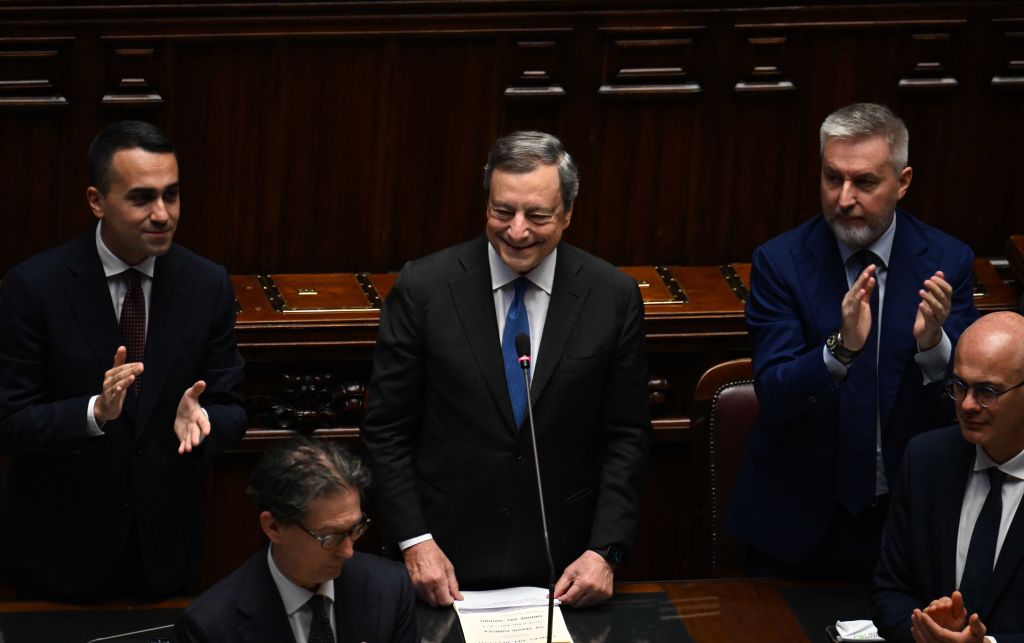
Italy is now barreling toward an uncertain political future. Prime Minister Mario Draghi, the former European Central Bank chief who saved the Eurozone almost exactly a decade ago by pledging publicly to do “whatever it takes” to steer Europe through its sovereign debt crisis, has abandoned hopes of seeing Italy through its current time of troubles. Italy must now weather the storms created by the human and economic losses from the pandemic and the energy and security crises created by Russia’s invasion of Ukraine with someone else in charge. Draghi will remain in his post until Italy can hold a national election before the end of September, but his work as leader of a rare unity government in Italy will remain unfinished.
In the words of Ernest Hemingway, the downfall of Draghi’s coalition came gradually, then suddenly. He agreed to form a government in February 2021 – Italy’s 19th in 33 years – only with support from both the left and the right. Give the crisis created by COVID-19 and the urgent need for help from the EU, most other major parties agreed. The center-left Democratic Party, the anti-establishment populist Five Star Movement, populist firebrand Matteo Salvini’s hard-core nationalist Lega, and former prime minister Silvio Berlusconi’s Forza Italia all signed on.
Over the past 17 months, sniping within the coalition has made Draghi’s life more difficult, but the need to secure relief funds from Brussels and the fear that new elections would unleash chaos held things together. Leaders of the right-wing parties who believed they could win a future election knew that a national vote was due no later than next spring.
But in June, the coalition began to fall apart. An increasingly hostile rift within the Five Star Movement, and then between Five Star and Lega, provoked ultimatums. When Five Star threatened to leave the government, there was hope Draghi would continue as prime minister with a narrower coalition. But when Lega and Forza Italia insisted the price of their continued support would be a more right-wing government in place of a unity coalition, Draghi resigned.
This upheaval comes at a terrible time for Italy. This next election will mark the first time in decades that a national vote has taken place in autumn, a period usually reserved for passing a budget. And Italy needs to pass a budget to implement the reforms the European Commission demands in exchange for a promised €200bn in grants and loans from the EU’s pandemic relief fund. That process will now be delayed because Italy’s president has dissolved parliament in advance of the September elections. Instead of fighting inflation, scrambling for ways to get through a difficult winter without Russian energy supplies, and helping consumers by fighting inflation, Italy’s leaders will be politicking, trading insults, and issuing political threats. Even after the votes are counted, it will take weeks to form a new government and to get it up and running.
Who will be the greatest beneficiary of this chaos? For now, the polls suggest an alliance of Italy’s right-wing parties will form the next government. Salvini’s Lega and Berlusconi’s Forza Italia will have seats at the table. But the big winner will likely be the one major party that refused from the beginning to support Draghi’s government, the nativist Brothers of Italy.
And that means Italians may be on the verge of electing Giorgia Meloni their first female prime minister. At 45, Meloni is nearly 30 years younger than the man she hopes to replace as prime minister, and her experience of government is limited, but her right-wing ideas are deeply rooted. As a teenager, she joined the Italian Social Movement, a party inspired by fascist leader Benito Mussolini. As a member of the right-wing National Alliance, she became Youth Minister in a government led by Berlusconi in 2008. She held that post, the only government job she’s had, for three years.
In 2014, she became a founding member of the intensely anti-immigrant Brothers of Italy. Defense of “God, fatherland and family” and pledges to keep migrants out will likely feature in her campaign speeches. Her position on Europe will be much more nuanced. In the past, she has insisted that EU treaties should be amended, and that Italian law should supersede EU rules. But she has never favored an Italian exit from the EU, and at a time when European money is crucial for Italian recovery and despite the occasional familiar reference to “Brussels bureaucrats,” she’s likely to downplay her party’s euro-skepticism. Draghi promised Europe that his government would liberalize competition laws and rewrite tax rules. Meloni knows that unless the next government is willing to keep some of these promises, Italy will face major cuts in EU funding. Nor is Meloni likely to upset the EU consensus in support of Ukraine. She has condemned Russia’s invasion and backed Draghi’s efforts to provide Ukraine will weapons and other support.
Giorgia Meloni’s bid to become prime minister is no sure thing. Infighting among right-wing parties and sharp election-season swings in public opinion could still shake things up. But Italy’s next prime minister won’t have Mario Draghi’s crisis-management experience or his inclination that problem-solving should transcend party politics. That’s bad news for a country all too familiar with political turmoil.
More Must-Reads From TIME
- The 100 Most Influential People of 2024
- Coco Gauff Is Playing for Herself Now
- Scenes From Pro-Palestinian Encampments Across U.S. Universities
- 6 Compliments That Land Every Time
- If You're Dating Right Now , You're Brave: Column
- The AI That Could Heal a Divided Internet
- Fallout Is a Brilliant Model for the Future of Video Game Adaptations
- Want Weekly Recs on What to Watch, Read, and More? Sign Up for Worth Your Time
Contact us at letters@time.com